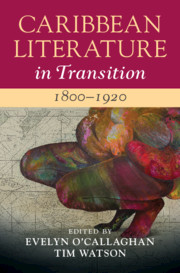Book contents
- Caribbean Literature in Transition, 1800–1920
- Caribbean Literature in Transition
- Caribbean Literature in Transition, 1800–1920
- Copyright page
- Contents
- List of Illustrations
- Contributors
- Acknowledgements
- Introduction
- Part I Literary and Generic Transitions
- Part II Cultural and Political Transitions
- Chapter 8 John Jacob Thomas and the Grammar of Freedom
- Chapter 9 How Barbados Transformed Radical British Author Eliza Fenwick into a Reactionary
- Chapter 10 Mary Seacole’s Travels and Tales
- Chapter 11 Genealogy and Nonhistory in Adolphus, A Tale
- Chapter 12 Obeah, Religion, and Nineteenth-Century Literature of the Anglophone Caribbean
- Part III The Caribbean Region in Transition
- Part IV Critical Transitions
- Bibliography
- Index
Chapter 8 - John Jacob Thomas and the Grammar of Freedom
from Part II - Cultural and Political Transitions
Published online by Cambridge University Press: 16 December 2020
- Caribbean Literature in Transition, 1800–1920
- Caribbean Literature in Transition
- Caribbean Literature in Transition, 1800–1920
- Copyright page
- Contents
- List of Illustrations
- Contributors
- Acknowledgements
- Introduction
- Part I Literary and Generic Transitions
- Part II Cultural and Political Transitions
- Chapter 8 John Jacob Thomas and the Grammar of Freedom
- Chapter 9 How Barbados Transformed Radical British Author Eliza Fenwick into a Reactionary
- Chapter 10 Mary Seacole’s Travels and Tales
- Chapter 11 Genealogy and Nonhistory in Adolphus, A Tale
- Chapter 12 Obeah, Religion, and Nineteenth-Century Literature of the Anglophone Caribbean
- Part III The Caribbean Region in Transition
- Part IV Critical Transitions
- Bibliography
- Index
Summary
John Jacob Thomas’s mid-nineteenth-century career exemplifies the contradictions of the post-abolition period. A schoolteacher who authored Theory and Practice of Creole Grammar (1869) and Froudacity: West Indian Fables Explained (1888), he parsed, literally and symbolically, the grammar of freedom. What did it mean to be free in a world in which non-whiteness was synonymous with servitude, and in which blackness and intellect were considered to be oxymoronic? Thomas’s efforts to vindicate 'freedom’s children' – the successors of the generation of enslavement – shed light on conceptions of mimicry, respectability, and literary and political authority that continue to shadow our postcolonial moment.
Keywords
- Type
- Chapter
- Information
- Caribbean Literature in Transition, 1800–1920 , pp. 137 - 150Publisher: Cambridge University PressPrint publication year: 2021

